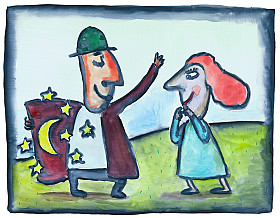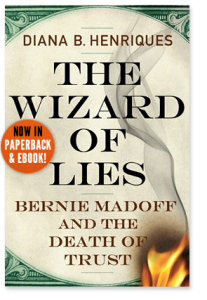Motivations behind some choices seem so impenetrable that even squinting close enough to crash into the subject you won’t find a mental foothold. That’s how I felt about Bernie Madoff and everything connected to his Ponzi scheme. How did he do it? Did his family really not know? How did he fool so many wise-in-the-ways-of-the-world investors?
Lives built on lies fascinate me. What story do people tell themselves? Do they feel justified, begin believing their own lies, and imagine they’re deserving of other people’s money—or do they envision that someday they’ll put it all right with none the wiser? Did Madoff think, like the guys from Enron and so many others, that he was always the smartest guy in the room?
Working with criminals, as I did for ten years, I knew their ability to fall into all the above. The thing about lying? It’s such an easy slide–or at least it seems so when that someone buys your deceit.
Madoff’s wife? I always believed (arguing with friends) in the possibility of Ruth Madoff being in the dark. Hell—titans of industry were fooled by him, why not his wife? My fascination extended to planning (long range) a novel based on a wife blindsided by her husband’s crime. What could that be like, having the entire fabric of one’s life ripped away by the man you’ve devoted yourself to since the age of 13? How do you make sense of life once you learn your life was built on sand? Does it make the love as false as your checkbook?
The Wizard of Lies: Bernie Madoff and the Death of Trust by Diana B. Henriques gripped me as tightly as any thriller—tighter perhaps, because instead of the “what happens,†I learned “how the hell it happened.†This man fooled almost everyone, including those in the SEC who investigated him (based on suspicions that were not followed through.) Descriptions of how he and his side-kicks—no, he did not do it alone—rigged up a phony computer show of trades and accounts astonished me same as any episode of “Homeland.â€
Corporate leaders, CEOs, CFO’s, fund managers, titans of industry, none of them questioned the impossible returns brought to them by Madoff. The steady returns were unbelievable—yet only a few skeptical souls paid attention to if it seems too good to be true, it probably isn’t.
It wasn’t true. It wasn’t good.
The Wizard of Lies provided an education in the murky world of finance(that usually makes me fuzzy-brained) and imparted the facts in electrifying prose. Lessons in greed applied not just to the pocketbook, but to the soul of the players, providing a heartbreaking and enraging portrait of the disasters caused by Madoff—whose family and victims tumbled from golden peaks to suicide, loss, and near-madness.
Author Henriques’ conclusions will stay with me forever. The lines below,which come close to the final paragraphs of her book, could serve as warning to all of us who’ve stepped over, or been tempted to step over the line. We believe, we’re desperate to believe, that Madoff is a far away ‘them’ and not a “us,â€but Henriques words serve as warning against the dangers of that hubris:
Madoff was not inhumanly monstrous. He was monstrously human. He was greedy for money and praise, arrogantly sure of his own capacity to pull it off, smugly dismissive of skeptics—just like anyone who mortgaged the house to invest in tech stocks, or tapped the off-limits college fund to gamble on a new business, or put all the retirement savings into a hedge fund they didn’t understand, or cheated a little on the tax return or the expense account or the spouse.
Just like us—only more so.
Henriques’ book unfolds a world of a billion dollar Ponzi scheme that at its core is no different than a ten-dollar offense:both depend on a suspension of disbelief to which anyone can succumb—the belief that the laws of the universe can be ignored when you want something enough.
This isn’t a book you’ll speed through, but it is a book that will fascinate and shed light on the hidden worlds operating in too many shiny corporate buildings around the world. Windows will open. Thank God. Because none of us can afford ignorance of that domain, nor the masters of that universe.
(originally published at Great New Books)

